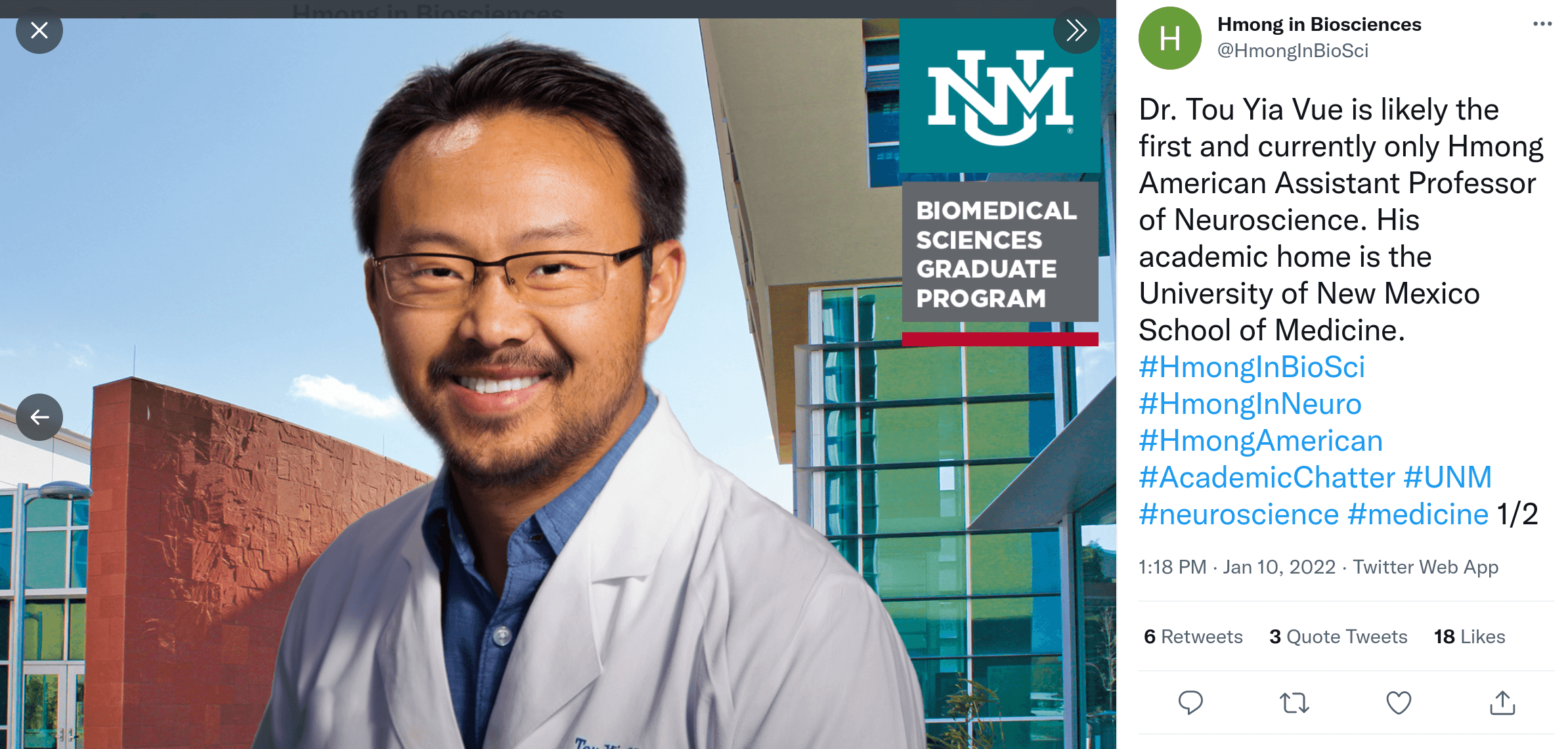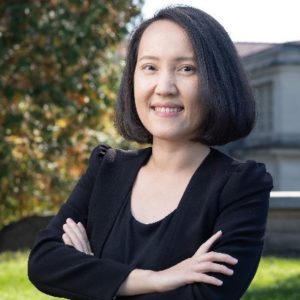
A new Twitter account launched last week to celebrate Hmong people in the biological sciences – and its creator calls it a “positive outcome” of an unfortunate situation.
Madisonian Kao Lee Yang, a doctoral student in neuroscience at the University of Wisconsin, posted on Twitter in October that the Howard Hughes Medical Institute refused to consider her for a prestigious fellowship – for which she was nominated by UW faculty – intended to support students from groups that are underrepresented in the sciences. Yang is Hmong, which falls under the federally-defined category “Asian,” which are not, as a whole, underrepresented in the sciences, according to federal government data.
As we reported in early November, Asian American leaders pointed to this as an example of the need to disaggregate data on people of different ethnic groups with roots in Asia.
Yang’s October 26 tweet about the fellowship went viral, which surprised her at the time.
“I didn’t think anyone would see it beyond my 22 followers at the time,” she said then. The thread was retweeted 2,000 times and Yang now has more than 700 followers.
Through that virality, “I was actually able to connect with a few other Hmong academics in the biological sciences,” she said. “And I’m grateful for that. This is one of the positive outcomes” of the experience of being denied the opportunity to apply for the HHMI fellowship.
Soon Yang decided to use the experience to highlight other Hmong bioscientists.
“I launched Hmong in Biosciences because I wanted to help us — there’s very few of us — have some visibility as a way to highlight the people who are already in the field doing the work either as a graduate student or as a professor or as staff,” she said. “And then also, hope that our visibility will encourage trainees to join the field or to explore the field.”
The project takes the form of a Twitter account – @HmongInBioSci – where Yang posts short profiles and photos of Hmong people working in the biological sciences, whether as a professor, academic staff or graduate student.
So far, Yang has posted two profiles: Shany Yang, a PhD student in the neuroscience graduate program at the University of Michigan, and University of New Mexico neuroscience professor Dr. Tou Yia Vue.
Dr. Tou Yia Vue is likely the first and currently only Hmong American Assistant Professor of Neuroscience. His academic home is the University of New Mexico School of Medicine. #HmongInBioSci #HmongInNeuro #HmongAmerican #AcademicChatter #UNM #neuroscience #medicine 1/2 pic.twitter.com/x41hNewbsH
— Hmong in Biosciences (@HmongInBioSci) January 10, 2022
@ShanyYang is a PhD student in the #neuroscience Graduate Program at the University of Michigan. She is interested in studying the molecular mechanisms and neural circuitry underlying neuropsychiatric disorders. She also has a strong interest in stress research. #HmongInBioSci pic.twitter.com/rndO6qC1Z9
— Hmong in Biosciences (@HmongInBioSci) January 12, 2022
Yang initially hoped the account could highlight Hmong people in neuroscience, but soon realized it’d be a pretty short run.
“I do hope that there’s more of us out there, but as of right now, only these three are in neuroscience that I know about,” Yang said.

Even expanding the scope to include any biological sciences, the population of Hmong scholars is limited; Yang has two more profiles in the works, and not many more lined up after that.
In fact, any Hmong people in the field – or anyone who knows a Hmong person in the field – is invited to tag or send a direct message to the @HmongInBioSci to introduce themselves.
Yang said it’s important to celebrate the current generation and inspire the next.
“I think there are a lot of barriers (to entering the field),” she said. “I think representation is one of them. Right now, since I’m a graduate student, I’m also mentoring undergraduate students and one thing that I hear from undergraduate students, especially students from underrepresented groups …is the importance of seeing someone who looks like you in a position that you want to pursue.”
Yang recalls being mentored by two Vietnamese professors as an undergraduate – not Hmong like her, but at least aware of and connected to Hmong history, such that Yang didn’t have to explain herself or her background.
“These are Southeast Asian women and they knew about Hmong people and Hmong history and that just made my experience smoother,” she said.
Yang hopes what began as a Twitter account will become something more.
“Maybe as the group grows, something I envision for it is that it could be a networking space,” where Hmong scientists could get to know each other through virtual gatherings and the like, Yang said. “I really hope that this community grows and that there are more of us out there or that there will be more of us out there.”
For its part, HHMI announced on November 12 – nearly three weeks after Yang’s initial tweet – that it would, in fact, allow Yang and one other student to apply, and would change its policy moving forward to rely less on federal ethnic categories.
“In addition, we will continue to consider how we and other organizations might better examine what ethnic groups are underrepresented in science,” the institution wrote in a statement posted to its website.
Yang is cautious to claim credit for that change – “I never want to assume causation,” she said – but is glad that HHMI reconsidered things.
“I am very grateful that moving forward, they will accept applications from students who are underrepresented in science and that they will consider different definitions of underrepresentation. And I think that is really good, moving forward,” she said.
But, she said, she declined their invitation to apply.
“Despite their reversal, I felt it wasn’t a good fit,” she said.



